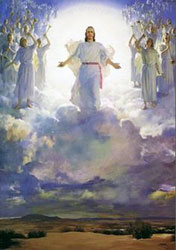Paul wrote letters to only seven churches, which is quite surprising as he founded churches in most of the cities he visited during his three missionary journeys of possibly around 10 years of travel. I haven’t counted the number of cities in which he ministered (and I haven’t found any writer who has), but I guess it could be fifty to one hundred.
First Thessalonians was one of his early letters, possibly the second after Galatians though some say the first, and it was closely followed by the second epistle. Both were written during Paul’s 18-month stay in Corinth during his second missionary journey, as recorded in Acts chapter 18. He had visited Thessalonica with Paul and Silas during the same journey. Of course, scholars have different views on the dates. It is short: just 89 verses and 1857 words in the KJV.
The main teaching we gain from the letter is something to really get excited about — the second coming of Christ Jesus. It is mentioned in each of the five chapters. Yes, Jesus is coming again! The two letters give us much detail about events leading up to the second coming and also of this major event. Let’s briefly look at each mention in I Thessalonians.
 In commending the believers there on how the word “sounded forth” to areas surrounding them, Paul mentions what others were saying about them. “For they themselves report concerning us the kind of reception we had among you, and how you turned to God from idols to serve the living and true God, (10)and to wait for his son from heaven, whom he raised from the dead, Jesus who delivers us from the wrath to come” (I Thessalonians 1:9-10 ESV). These verses are a summary of the Christian life: 1. Turn to God from idols. 2. Serve the real God (Moffatt). 3. Wait for the coming of his son from heaven.
In commending the believers there on how the word “sounded forth” to areas surrounding them, Paul mentions what others were saying about them. “For they themselves report concerning us the kind of reception we had among you, and how you turned to God from idols to serve the living and true God, (10)and to wait for his son from heaven, whom he raised from the dead, Jesus who delivers us from the wrath to come” (I Thessalonians 1:9-10 ESV). These verses are a summary of the Christian life: 1. Turn to God from idols. 2. Serve the real God (Moffatt). 3. Wait for the coming of his son from heaven.
Again in chapter 2 Paul compliments the believers. “For what is our hope or joy or crown of boasting before our Lord Jesus at his coming? Is it not you? (20)For you are our glory and joy” (2:19-20). Paul was certainly looking forward to the second coming!
In chapter 3 the mention of the second coming is in the form of a prayer. “And may the Lord make you increase and abound in love for one another and for all, as we do for you, (13)so that he may establish your hearts blameless in holiness before our God and Father, at the coming of our Lord Jesus with all his saints” (3:12-13). Holiness is a reminder that the God looks at what He placed in you, and that they should allow Him to establish, strengthen, stabilize their hearts, the seat of their personal lives, in His holiness. It also mentions Christ coming with all the saints.
In chapter 4, Paul gives assurance that those who die before the second coming will come back with Christ and will lead the procession. “For the Lord himself will descend from heaven with a cry of command, with the voice of an archangel, and with the sound of the trumpet of God. And the dead in Christ will rise first. (17)Then we who are alive, who are left, will be caught up together with them in the clouds to meet the Lord in the air, and so we will always be with the Lord. (18)Therefore encourage one another with these words” (4:16-18). So let’s encourage one another that all believers will be united at this great coming event.
 Finally, chapter 5 has a number of verses regarding the second coming of Christ. “But you are not in darkness, brothers, for that day to surprise you like a thief” (5:4). “Now may the God of peace himself sanctify you completely, and may your whole spirit and soul and body be kept blameless at the coming of our Lord Jesus Christ. (24)He who calls you is faithful; he will surely do it” (5:23-24). There is a notable progression of names in these mentions. In chapter 1 Christ is simply called “the son.” In chapters 2 and 3 he is termed “our Lord Jesus.” In chapter 4 we have “the Lord” and “Christ.” And in chapter 5 the full title, “our Lord Jesus Christ.”
Finally, chapter 5 has a number of verses regarding the second coming of Christ. “But you are not in darkness, brothers, for that day to surprise you like a thief” (5:4). “Now may the God of peace himself sanctify you completely, and may your whole spirit and soul and body be kept blameless at the coming of our Lord Jesus Christ. (24)He who calls you is faithful; he will surely do it” (5:23-24). There is a notable progression of names in these mentions. In chapter 1 Christ is simply called “the son.” In chapters 2 and 3 he is termed “our Lord Jesus.” In chapter 4 we have “the Lord” and “Christ.” And in chapter 5 the full title, “our Lord Jesus Christ.”
In II Thessalonians, also written from Corinth, Paul continues the theme by reminding them that the second coming is a literal event, and they are not to be deceived by some who were apparently spiritualizing what he had taught them (2:1-3). He then speaks of last-day events that were yet to occur. They were to “stand firm” (2:15) on the Pauline revelation — and that is an imperative for us to do also. “So, friends, take a firm stand, feet on the ground and head high. Keep a tight grip on what you were taught, whether in personal conversation or by our letter” (II Thessalonians 2:15 MSG). — Peter Wade.



Leave A Comment